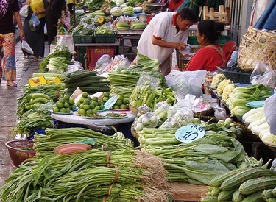 Buying organic produce is no longer just for hippies and environmental activists. But why would you buy organic over ‘regular’ products and what does ‘organic’ mean?
Buying organic produce is no longer just for hippies and environmental activists. But why would you buy organic over ‘regular’ products and what does ‘organic’ mean?
If food is classified as organic, this basically refers to the natural way in which the food has been grown and processed.
Organic plant products such as fruit, veges and grains will have been produced without artificial fertilisers or conventional pesticides, food additives or contact with human/industrial waste. Also, organic meat and dairy means the animals haven’t been given growth hormones or antibiotics. In most countries, it can’t be called organic if it’s been genetically modified.
It’s not just food – organic produce can also be used to create beauty products and medicines.
Why would I buy organic?
If you’re keen on being eco-friendly, organically-grown food is generally better for the environment. There are no pesticides/chemicals introduced into the soil and waters surrounding the farm. However, on the other side of things, organic farms usually have a smaller yield so more land may be required to obtain the same amount of food as a ‘normal’ farm.
Many people also believe that organic food is better for your health due to fewer chemicals being used. Some also say organic food tastes tastes better.
Phoenix Organics is one of the New Zealand companies trying to make a difference by only using certified organic produce in their beverages (with the exception of their hot drinks).
Phoenix Organics say that “finding enough certified ingredients for our growing range remains a constant challenge, but one we relish”. They’re still willing to do it in pursuit of environmental sustainability. Organic foods are becoming more widely available and although you’re more likely to get a wider range of products at a speciality organics store, there are some items you will be able to find at your local supermarket.
Organic food buying tips
- When it comes to packaged products, just because it’s organic, does NOT mean it’s healthy! Read the food labels to make sure the product is still not high in salt, sugar and/or fat.
- Buying organic food can become a bit costly (as it’s usually dearer than conventionally produced food). Try to shop for fruit and veges that are in season – this should help keep your bank balance happy.
- If you’re only concerned about pesticides, remember that you can probably skip organic and buy conventionally-produced fruit and veges if it’s something you peel (i.e. bananas, oranges).
- If you’re only really interested in ethical shopping, look for the words organic, cruelty-free, GE free and fair trade while you’re perusing through the contents of your supermarket.
LINKS:
– OrganicDirect.co.nz (has good info on farmers’ markets around the country)
Any other links you would like to recommend? Let us know and comment below!
Image / Flickr – Luigi Guarino

